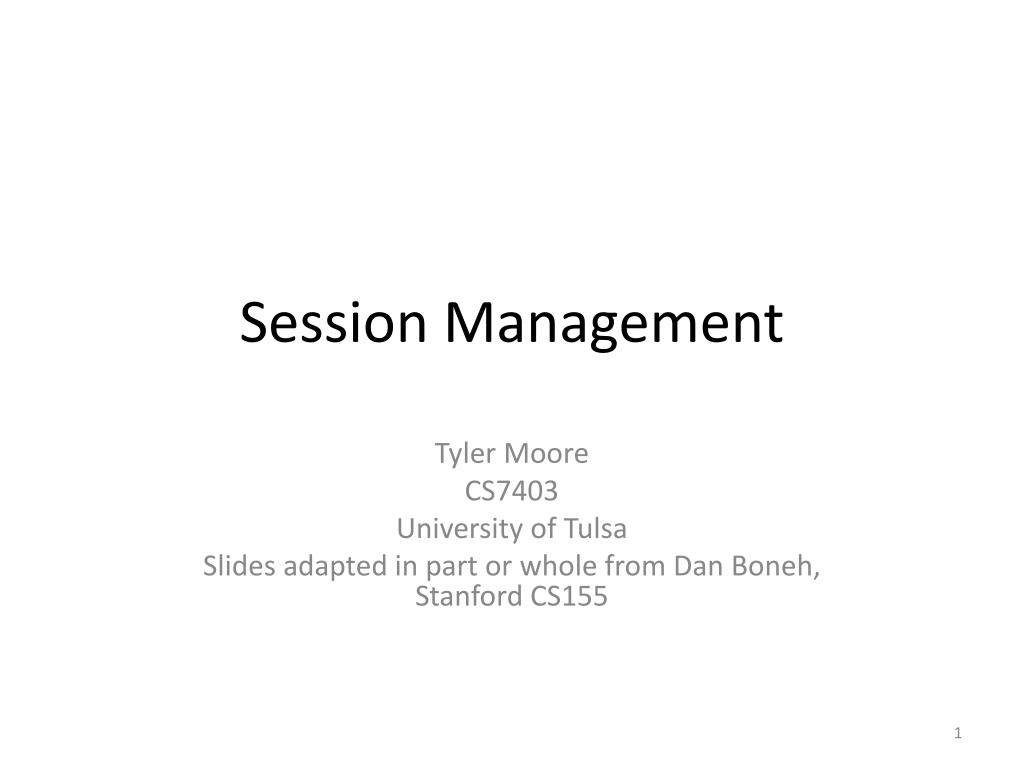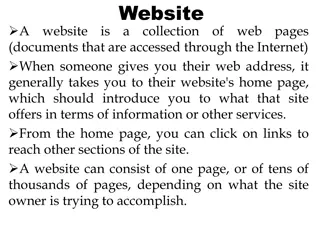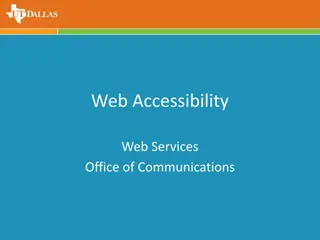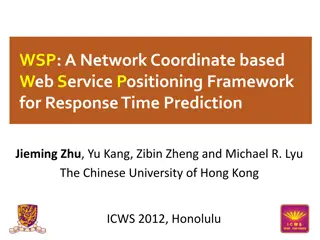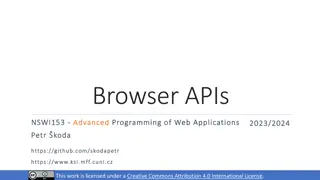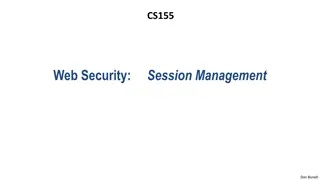Understanding Session Management Challenges in Web Applications
Session management is crucial in web applications to maintain user authentication and authorization. This presentation delves into the evolution of session management, highlighting issues with HTTP authentication, the use of session tokens, and challenges in storing and securing session data. Various methods such as browser cookies, embedding tokens in URLs, and hidden form fields are discussed along with their limitations. The presentation emphasizes the importance of addressing these challenges to ensure secure and seamless user experiences on the web.
Download Presentation

Please find below an Image/Link to download the presentation.
The content on the website is provided AS IS for your information and personal use only. It may not be sold, licensed, or shared on other websites without obtaining consent from the author. Download presentation by click this link. If you encounter any issues during the download, it is possible that the publisher has removed the file from their server.
E N D
Presentation Transcript
Session Management Tyler Moore CS7403 University of Tulsa Slides adapted in part or whole from Dan Boneh, Stanford CS155 1
Sessions A sequence of requests and responses from one browser to one (or more) sites Session can be long (e.g. Gmail) or short without session mgmt: users would have to constantly re-authenticate Session mgmt: authorize user once; All subsequent requests are tied to user 2
Pre-history: HTTP auth HTTP request: GET /index.html HTTP response contains: WWW-Authenticate: Basic realm="Password Required Browsers sends hashed password on all subsequent HTTP requests: Authorization: Basic ZGFddfibzsdfgkjheczI1NXRleHQ= 3
HTTP auth problems Hardly used in commercial sites: User cannot log out other than by closing browser What if user has multiple accounts? multiple users on same machine? Site cannot customize password dialog Confusing dialog to users Easily spoofed 4
Session tokens web site Browser GET /index.html set anonymous session token GET /books.html anonymous session token check credentials (crypto) POST /do-login Username & password elevate to a logged-in session token POST /checkout logged-in session token Validate token 5
Storing session tokens: Lots of options (but none are perfect) Browser cookie: Set-Cookie: SessionToken=fduhye63sfdb Embed in all URL links: https://site.com/checkout ? SessionToken=kh7y3b In a hidden form field: <input type= hidden name= sessionid value= kh7y3b > 6
Storing session tokens: problems Browser cookie: browser sends cookie with every request, even when it should not (CSRF) Embed in all URL links: token leaks via HTTP Referer header (or if user posts URL in a public blog) In a hidden form field: does not work for long- lived session Best answer: a combination of all of the above 7
The HTTP referer header Referer leaks URL session token to 3rd parties Referer supression: not sent when HTTPS site refers to an HTTP site in HTML5: <a rel= noreferrer href=www.example.com> 8
The Logout Process Web sites must provide a logout function: Functionality: let user to login as different user Security: prevent others from abusing account What happens during logout: 1. Delete SessionToken from client 2. Mark session token as expired on server Problem: many web sites do (1) but not (2) !! Especially risky for sites who fall back to HTTP after login 9
Session hijacking Attacker waits for user to login then attacker steals user s Session Token and hijacks session attacker can issue arbitrary requests on behalf of user Example: FireSheep [2010] Firefox extension that hijacks Facebook session tokens over WiFi. Solution: HTTPS after login 11
Beware: Predictable tokens Example 1: counter user logs in, gets counter value, can view sessions of other users Example 2: weak MAC. token = { userid, MACk(userid) } Weak MAC exposes k from few cookies. Apache Tomcat: generateSessionId() Returns random session ID [server retrieves client state based on sess-id] 12
Session tokens must be unpredictable to attacker To generate: use underlying framework (e.g. ASP, Tomcat, Rails) Rails: token = MD5( current time, random nonce ) 13
Beware: Session token theft Example 1: login over HTTPS, but subsequent HTTP Enables cookie theft at wireless Caf (e.g. Firesheep) Other ways network attacker can steal token: Site has mixed HTTPS/HTTP pages token sent over HTTP Man-in-the-middle attacks on SSL Example 2: Cross Site Scripting (XSS) exploits Amplified by poor logout procedures: Logout must invalidate token on server 14
Mitigating SessionToken theft by binding SessionToken to client s computer A common idea: embed machine specific data in SID Client IP addr: makes it harder to use token at another machine But honest client may change IP addr during session client will be logged out for no reason. Client user agent: weak defense against theft, but doesn t hurt. SSL session id: same problem as IP address (and even worse) 15
Session fixation attacks Suppose attacker can set the user s session token: For URL tokens, trick user into clicking on URL For cookie tokens, set using XSS exploits Attack: (say, using URL tokens) 1. Attacker gets anonymous session token for site.com 2. Sends URL to user with attacker s session token 3. User clicks on URL and logs into site.com this elevates attacker s token to logged-in token 4. Attacker uses elevated token to hijack user s session. 16
Session fixation: lesson When elevating user from anonymous to logged-in: always issue a new session token After login, token changes to value unknown to attacker Attacker s token is not elevated. 17
Summary Always assume cookie data retrieved from client is adversarial Session tokens are split across multiple client state mechanisms: Cookies, hidden form fields, URL parameters Cookies by themselves are insecure (CSRF, cookie overwrite) Session tokens must be unpredictable and resist theft by network attacker Ensure logout invalidates session on server 18
